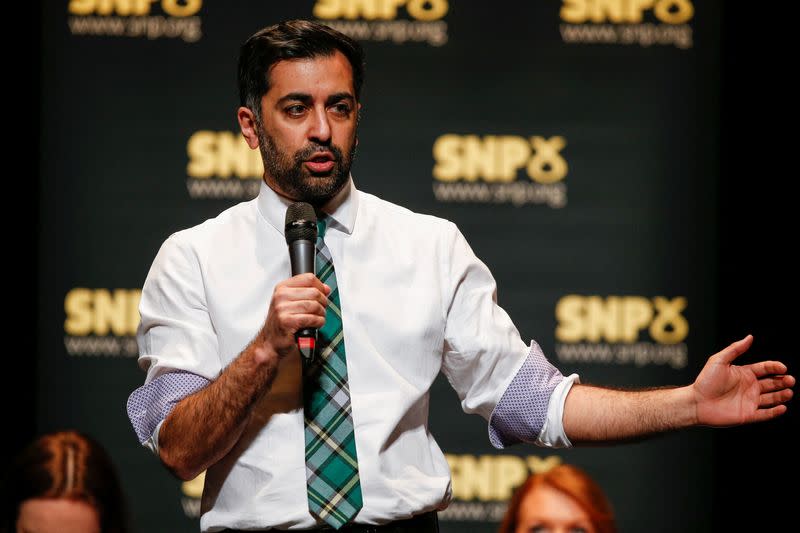Scotland's leader faces knife-edge no-confidence vote after collapsing coalition

- Oops!Something went wrong.Please try again later.
By Alistair Smout and William James
LONDON (Reuters) -Scotland's leader faced a fight for his political future on Thursday as opponents said they would try to oust him after his once dominant pro-independence party abandoned a coalition with the Greens.
Scottish National Party leader Humza Yousaf, who serves as first minister in Scotland's devolved government, ended an alliance with the Greens after a dispute over a decision to scrap a climate change emissions reduction target last week.
The Scottish arm of the Conservative Party that governs Britain said it would seek to topple Yousaf with a no-confidence motion, calling him a "lame duck".
Yousaf's position now hangs on a knife-edge vote after almost all other parties - including his former coalition partners, said they would vote against him. The vote could be held next week.
If Yousaf loses, he would be expected to resign, and if parliament fails to back a replacement first minister, there would be an election.
The SNP's fortunes have faltered since a funding scandal and the resignation of a party leader last year, while there has been infighting over how progressive its pitch should be as it seeks to woo back voters.
Earlier this month, a YouGov poll put the main British opposition Labour Party slightly ahead of the SNP in Scotland for the first time since Scottish voters chose to remain part of the United Kingdom in a 2014 independence referendum.
Any swing towards Labour, which opposes independence, in a fresh election in Scotland could further damage nationalist hopes of another referendum.
The SNP overwhelmingly dominates Scotland's representation in the British parliament in Westminster, and its poll slide in favour of Labour could have a major impact on the outcome of a UK-wide general election expected this year.
Yousaf told a news conference he had terminated the 2021 coalition agreement with the Greens and would run a minority government until Scottish parliamentary elections due in 2026.
In the Scottish parliament, the SNP has 63 seats out of 129, falling just short of an outright majority. The Greens have seven, the Conservatives 31, Labour - once the dominant force in Scotland - has 22 and the Liberal Democrats have four.
If they all vote against Yousaf, then the SNP would need the backing of Ash Regan - his former SNP leadership rival who then acrimoniously left the party - for Yousaf to survive.
Yousaf had said he still hoped to work with the Greens and other opposition parties, but they ridiculed him for abandoning the coalition days after saying he favoured continuing it.
Scottish Green co-leader Lorna Slater said Yousaf had sided with the conservative wing of his party so could not rely on Green support any longer.
"This is a real threat for progressive politics in Scotland," Slater said, outlining the decision to express no confidence in Yousaf in the vote.
The SNP's poll leads have waned since then-leader Nicola Sturgeon stepped down in early 2023. Her husband was charged last week with embezzling funds from the SNP. She has been arrested and questioned but not charged. Both deny wrongdoing.
(Reporting by William James, Alistair Smout and Farouq Suleiman; writing by Kate HoltonEditing by Elizabeth Piper, Paul Sandle, Peter Graff and Sharon Singleton)

